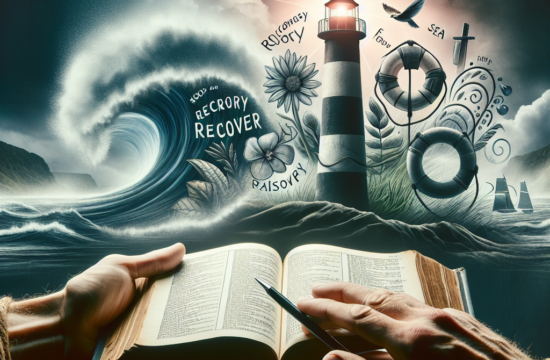==> Thank you for reading this post! Click Here If you are looking for support and Victory over PTSD.
Why Biblical Healing for PTSD Is Transformative
- Faith-Based Approaches to Healing
- Spiritual Practices that Support Recovery
- The Importance of Community in Healing
- The Role of Scripture in Overcoming Trauma
Faith-Based Approaches to Healing
The Power of Faith in Healing
Faith has this incredible way of holding us through our darkest times. When I was grappling with PTSD, I often felt lost and overwhelmed. But leaning into my faith provided a beacon of hope that helped to guide me through those tumultuous waters. It was a reminder that there was something bigger than myself out there, and that gave me strength to confront my fears.
Through prayer, I found a safe space to express my innermost feelings. It wasn’t just a one-way conversation either; it was about listening, too. When I paused to reflect, I realized that my faith was not about having all the answers, but rather about trusting the process and being open to healing.
This journey isn’t something you have to navigate alone. Many faith communities offer support systems that can really help someone grappling with PTSD. Hearing others share their stories of healing can inspire and motivate you to embark on your personal journey as well.
<h3_The Role of Spirituality in Recovery
Spirituality can be a powerful force in recovery. By exploring my spiritual side, I discovered new coping mechanisms that weren’t there before. It’s about connecting with something greater and finding peace in the chaos that PTSD creates. Meditation, prayer, and reflection became daily rituals that truly transformed how I handled my anxiety and flashbacks.
Moreover, embracing a spiritual approach allowed me to redefine my identity beyond being a trauma survivor. It encouraged me to believe in my resilience and to focus on who I could become rather than who I had been. Spirituality offered a lens through which I could view my struggles and growth.
Incorporating spirituality into healing doesn’t require lofty practices. It can be as simple as walking in nature and feeling gratitude, reading uplifting passages, or meditative breathing. These practices can deepen the connection to oneself and foster a sense of peace amidst the struggle.
Finding Purpose Through Faith
Rediscovering purpose is incredibly healing. I learned that many individuals with PTSD find strength when they align with their faith and take action. It might involve volunteering, sharing personal experiences, or simply being there for someone else who’s struggling. These actions not only help others, but they also remind us of our own capability to make a difference.
The journey to recovery can often feel isolating, but by engaging in purposeful activities, I’ve seen firsthand how it builds connections and restores a sense of belonging. Finding purpose can be a catalyst for transformation, reshaping how we view ourselves and our experiences.
Embracing faith in this process of finding purpose taught me that healing isn’t just about retreating from pain but about stepping forward with intention and clarity. It’s about continuing to grow and uplift others as we heal.
Spiritual Practices that Support Recovery
Meditation and Mindfulness as Healing Tools
Meditation was a game-changer for me. It helped quiet my mind, which often felt like a tornado of racing thoughts. By incorporating simple mindfulness techniques into my daily life, I discovered a new layer of calm I didn’t know existed. Just a few minutes of focused breathing can create a monumental shift in how I deal with triggers.
Mindfulness isn’t just about meditation; it’s about being present. I learned to anchor myself in the moment, using my senses to draw my attention away from unsettling thoughts. It became a practice I could use in any situation that felt overwhelming—whether it was a crowded room or a troubling flashback.
And let me tell you, the beauty of mindfulness is that it’s totally adaptable. You can practice it on a walk, while sipping coffee, or just sitting quietly in a park. The key is finding what feels good for you and makes that connection to peace.
The Impact of Prayer on Recovery
Prayer became a powerful ally in my healing journey. Whether it was formal prayers or just casual conversations with God, it created a deep sense of comfort. Those moments became opportunities for expressing gratitude, asking for guidance, and surrendering my fears. Each prayer was like a release of pent-up emotions that lightened the burden I was carrying.
Furthermore, praying for others, even when you’re hurting, can shift focus away from yourself. It solidifies our interconnectedness and nurtures compassion, which is so crucial when we’re enveloped in pain. This outward focus often brought me a profound sense of peace.
Ultimately, the impact of prayer is personal. It can be a structured routine or spontaneous moments throughout the day. The key is to approach it authentically, making it a genuine conversation rather than a task.
Embracing Rituals and Traditions
Rituals can hold significant meaning and create a sense of stability. I found comfort in re-establishing traditions that resonate with my faith, whether it be lighting a candle, journaling, or attending a weekly service. These rituals provided structure during chaotic times and became anchors that reminded me there is normalcy despite my struggles.
Moreover, engaging in rituals can deepen your relationship with your spirituality. They offer a space for reflection and gratitude, allowing me to honor my journey while also embracing growth. It creates a reflection of where I am right now but also where I aspire to be.
Ultimately, these traditions aren’t just tasks to check off; they represent commitment to your healing journey. It’s about finding what resonates with you and nurturing it regularly to foster ongoing connection and healing.
The Importance of Community in Healing
Building Support Networks
Community can make all the difference in your healing journey. I realized that fighting the demons of PTSD alone can feel isolating. Building a network of like-minded individuals helped me feel understood and supported. Whether it was connecting with others in a church group or locally organized support circles, being in the company of others made the struggle feel less daunting.
Moreover, sharing experiences can be incredibly cathartic. We each have our unique stories, and when we share them, there’s a beautiful exchange that leads to deeper understanding and empathy. It’s like a healing balm that reassures you that you aren’t alone on this path.
Get Started with Recovery! Visit us for more Information and Support
Finding your community might require some effort, but it’s worth it. Sometimes, the right connections can provide insights or encouragement that can uplift your entire perspective and lead you on a positive trajectory.
The Role of Fellowship in Spiritual Growth
Fellowship isn’t just about friendship; it’s about growing spiritually together and supporting one another’s journeys. When I immersed myself in church activities and community outreach, I found profound relationships that helped me navigate my PTSD symptoms. There’s strength in numbers, and being surrounded by people who share your values is incredibly reassuring.
Through fellowship, I discovered accountability as well. Knowing that I was part of a group motivated me to work on my healing actively. We cheered for each other’s victories, big and small, and that made me feel like I was contributing to something greater than myself.
This shared journey of growth also opened up new avenues for learning. I found inspiration through discussions that led to deeper understanding of faith, resilience, and compassion. Just being in that environment enriched my healing experience tremendously.
Finding Resilience in Shared Experiences
Resilience thrives in resilience; when we see others overcome similar challenges, we get a burst of hope. I found it incredibly helpful to listen to stories of people who had walked the same path I was on. Hearing how they coped and overcame adversity helped me realize that healing is indeed attainable.
Collectively, we learn from each other and create an uplifting atmosphere that encourages healing. Knowing someone has been where you are and made it through is empowering. It allows you to envision your own success in overcoming the struggles of PTSD.
Thus, embracing the power of storytelling creates a loop of inspiration. We share, we learn, and we grow—it’s a beautiful cycle that makes all of us stronger together.
The Role of Scripture in Overcoming Trauma
Finding Comfort and Guidance in the Bible
The Bible became a refuge during my darkest moments. I turned to its passages for comfort, and they often felt like a warm hug on a cold day. I found wisdom and guidance through the scriptures, each verse providing insights that resonated with my struggles.
One of the most impactful things was discovering verses related to fear and courage. They reminded me that I wasn’t alone—that God was with me, even when my mind was playing tricks. My faith in those moments solidified my understanding of divine presence guiding my life.
When we write down and meditate on these scriptures, they have a way of becoming embedded in our hearts. Reflecting on these verses became daily reminders of hope and encouragement that fueled my recovery process.
Using Scripture for Affirmations
A powerful strategy that worked for me was using scriptural affirmations. Phrases from the Bible, recited aloud with conviction, began to reshape how I viewed my situation. I would repeat verses emphasizing strength, healing, and peace that resonated with my journey. It transformed my mindset from a place of fear to one of empowerment.
Affirmations serve as a reminder of the promises and blessings in scripture. They instill confidence and encourage resilience during challenging times. By consistently affirming these positive truths, I found myself slowly breaking the grip of PTSD over my life.
This practice equips me with tools to combat negativity. While anxiety might arise unexpectedly, I would focus on these affirmations, anchoring myself in faith. It became a vital part of my healing process.
Creating a Personalized Scripture Practice
Turning scripture into a personalized practice was a revelation. I’d often journal about my experiences and pair them with relevant passages—a merging of thoughts and faith that felt authentic. This practice not only allowed me to vent but also fostered a profound connection to my healing process through the Bible.
Additionally, I started picking a verse each week to meditate upon. This focused practice allowed deeper contemplation of how it applied to my life. It helped me uncover layers of meaning that I had previously overlooked.
Over time, creating such a practice reaped rewards. It became a lifeline, reinforcing my faith and commitment to healing. I encourage anyone struggling with PTSD to explore how scripture can deepen their recovery journey—finding your unique approach can unlock pathways to transformation!
FAQ
1. How can faith help in the recovery from PTSD?
Faith can provide a sense of purpose, hope, and connection. It often acts as an anchor during turbulent times, offering strength as you navigate your healing journey. Embracing a faith-based approach allows individuals to confront their fears and trust in a greater plan.
2. What spiritual practices are suggested for supporting recovery?
Meditation, prayer, and engaging in community rituals are excellent practices. These activities help foster mindfulness, enhance connection to the spiritual, and create opportunities for gratitude and personal reflection.
3. Why is community essential in healing from PTSD?
A community provides a support network, reducing feelings of isolation. Sharing experiences and finding fellowship can create understanding and support, reinforcing the idea that healing is achievable with collective strength.
4. How does scripture contribute to overcoming trauma?
Scripture serves as a source of comfort and guidance, often equipped with affirmations that reshape our mindset. By reflecting on relevant passages, individuals can derive strength, resilience, and hope, enhancing their healing journey.












